unit2 poems2
- 格式:ppt
- 大小:4.12 MB
- 文档页数:46
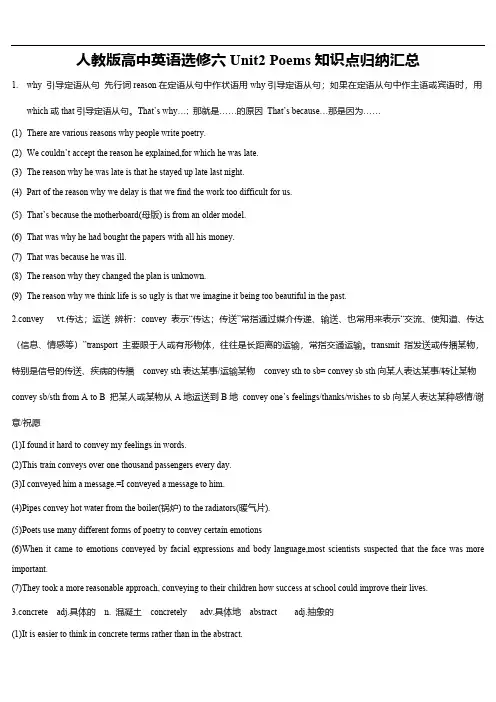
人教版高中英语选修六Unit2 Poems知识点归纳汇总1.why 引导定语从句先行词reason在定语从句中作状语用why引导定语从句;如果在定语从句中作主语或宾语时,用which或that引导定语从句。
That’s why…; 那就是……的原因That’s because…那是因为……(1)There are various reasons why people write poetry.(2)We couldn’t accept the reason he explained,for which he was late.(3)The reason why he was late is that he stayed up late last night.(4)Part of the reason why we delay is that we find the work too difficult for us.(5)That’s because the motherboard(母版) is from an older model.(6)That was why he had bought the papers with all his money.(7)That was because he was ill.(8)The reason why they changed the plan is unknown.(9)The reason why we think life is so ugly is that we imagine it being too beautiful in the past.2.convey vt.传达;运送辨析:convey 表示“传达;传送”常指通过媒介传递、输送、也常用来表示“交流、使知道、传达(信息、情感等)”transport 主要限于人或有形物体,往往是长距离的运输,常指交通运输。

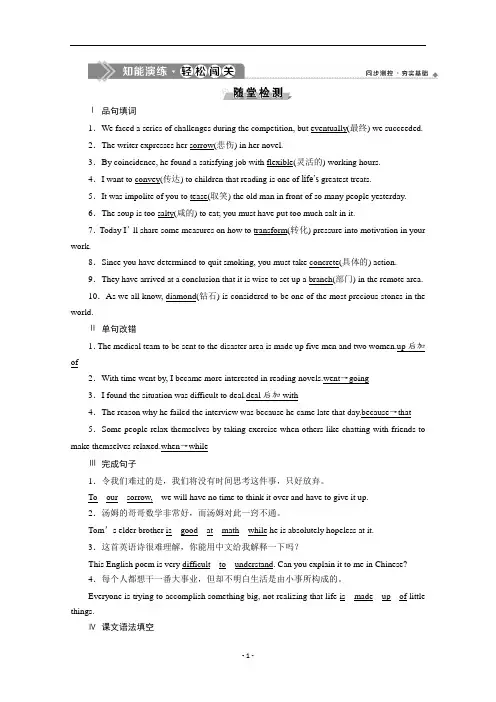
Ⅰ品句填词1.We faced a series of challenges during the competition, but eventually(最终) we succeeded.2.The writer expresses her sorrow(悲伤) in her novel.3.By coincidence, he found a satisfying job with flexible(灵活的) working hours.4.I want to convey(传达) to children that reading is one of life’s greatest treats.5.It was impolite of you to tease(取笑) the old man in front of so many people yesterday.6.The soup is too salty(咸的) to eat; you must have put too much salt in it.7.Today I’ll share some measures on how to transform(转化) pressure into motivation in your work.8.Since you have determined to quit smoking, you must take concrete(具体的) action.9.They have arrived at a conclusion that it is wise to set up a branch(部门) in the remote area.10.As we all know, diamond(钻石) is considered to be one of the most precious stones in the world.Ⅱ单句改错1.The medical team to be sent to the disaster area is made up five men and two women.up后加of2.With time went by, I became more interested in reading novels.went→going3.I found the situation was difficult to deal.deal后加with4.The reason why he failed the interview was because he came late that day.because→that 5.Some people relax themselves by taking exercise when others like chatting with friends to make themselves relaxed.when→whileⅢ完成句子1.令我们难过的是,我们将没有时间思考这件事,只好放弃。

Unit 2 Poems诗歌一、词汇1.convey vt. 传达;传送把……传达/转递给某人convey sth. to sb.=convey to sb. sth.convey sb./ sth. from A to B把某人或某物从A地运送到B地convey one’s feelings / thanks / wishes(to sb.)(向某人)表达感情/谢意/祝愿①Please convey my best wishes to your parents.②The train conveyed him from his hometown to a new city.③Words can not convey my feelings at the moment.2.flexible adj.灵活的;可弯曲的;柔顺的flexibly adv.灵活地flexibility n.灵活性;柔韧性;适应性①We need a foreign policy(外交政策)that is more flexible.②You can deal with(处理)it flexibly.③He shows great flexibility in handling complex(复杂的)problems.3.take it easy=take things easy轻松;不紧张;从容take it/things easy 指在心理上“别紧张,别着急”,相当于don’t benervous.take one’s time 指在时间上不用慌张,因为There’s enough timeleft(时间充裕).①---I’m sorry I made a mistake.-----Take it/ things easy. Nobody is perfect(完美的).②Take your time,we still have 20 minutes left.4. run out of 用完run across偶然遇见run into撞上;偶遇;达到run away逃走;溜掉run after追赶run through 快速传遍run over浏览;撞倒并倾轧辨析run out “被用完了”含被动意义,主语通常是时间、金钱、食物等无生命的东西run out of of后接被用完的东西,如money,ink,food,petrol等,其主语为人use up 及物动词短语,其后可接表物的名词作宾语,可用于被动语态give out 作“分发,发出(气味、光、热等)”讲时为及物动词短语;作“用完、耗尽”讲时,为不及物动词短语,不用于被动语态①Tom was running after Jerry when Jerry ran into a person. Both of them ran out of their strength.②I have used up / have run out of my money. Please lend me some. =My money has run out.Please lend me some.5. be made up of由……构成(1)consist of(不用于被动语态和进行时态)由……组成be composed of由……组成(2)make up构成;编造;化妆make up for弥补make out辨认出;理解;领会make for去……,有利于make it获得成功make the most of充分利用①The team is made up of 10 people.=The team is composed of 10 people.=The team consists of 10 people.=10 people make up the team.②H e made up a story for his son.③It took her half an hour to make herself up.④We have to make up for the lost time.⑤I can’t make out your meaning.⑥Running makes for our health.⑦You will make it if you try.⑧We should make the most of the chance.6. tease vi.&vt.取笑;招惹;戏弄tease sb. about sth.因某事而嘲笑某人laugh at嘲笑make fun of取笑make a fool of嘲笑;愚弄play a trick/ tricks on捉弄play a joke/ jokes on开……的玩笑Other boys tease him for his being fat.7. in particular尤其;特别be particular about /over对……挑剔be particular to为……所特有in particular = particularly adv. 尤其;特别①He is particular about what he wears.②As is known to all, pandas are particular to China.③I enjoy this song in particular/ particularly.8. transform vi.&vt.转化;转换;改造;变换transform A into B 使A变成B transform into转化成;改造成transformation n.改变;变革①They have transformed their rooms into a hotel.②The company has been transformed from a family business into a state operation.这家已由家族企业变成一个国家运作机构。
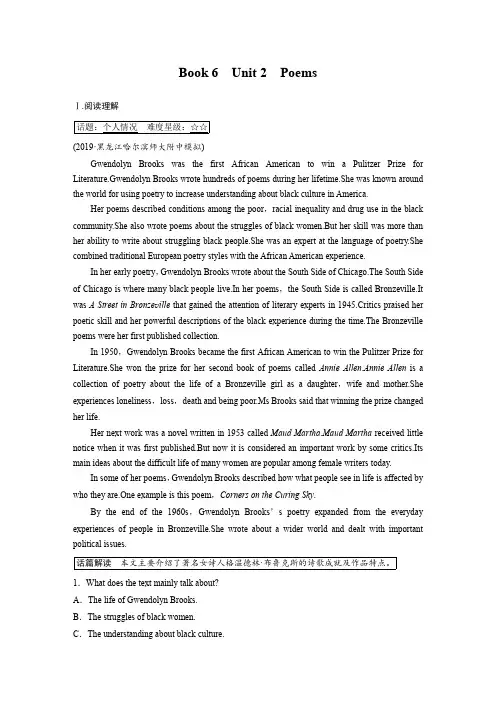
Book 6Unit 2PoemsⅠ.阅读理解(2019·黑龙江哈尔滨师大附中模拟)Gwendolyn Brooks was the first African American to win a Pulitzer Prize for Literature.Gwendolyn Brooks wrote hundreds of poems during her lifetime.She was known around the world for using poetry to increase understanding about black culture in America.Her poems described conditions among the poor,racial inequality and drug use in the black community.She also wrote poems about the struggles of black women.But her skill was more than her ability to write about struggling black people.She was an expert at the language of poetry.She combined traditional European poetry styles with the African American experience.In her early poetry,Gwendolyn Brooks wrote about the South Side of Chicago.The South Side of Chicago is where many black people live.In her poems,the South Side is called Bronzeville.It was A Street in Bronze v ille that gained the attention of literary experts in 1945.Critics praised her poetic skill and her powerful descriptions of the black experience during the time.The Bronzeville poems were her first published collection.In 1950,Gwendolyn Brooks became the first African American to win the Pulitzer Prize for Literature.She won the prize for her second book of poems called Annie Allen.Annie Allen is a collection of poetry about the life of a Bronzeville girl as a daughter,wife and mother.She experiences loneliness,loss,death and being poor.Ms Brooks said that winning the prize changed her life.Her next work was a novel written in 1953 called Maud Martha.Maud Martha received little notice when it was first published.But now it is considered an important work by some critics.Its main ideas about the difficult life of many women are popular among female writers today.In some of her poems,Gwendolyn Brooks described how what people see in life is affected by who they are.One example is this poem,Corners on the Curing Sky.By the end of the 1960s,Gwendolyn Brooks’s poetry expanded from the everyday experiences of people in Bronzeville.She wrote about a wider world and dealt with important political issues.话篇解读本文主要介绍了著名女诗人格温德林·布鲁克斯的诗歌成就及作品特点。
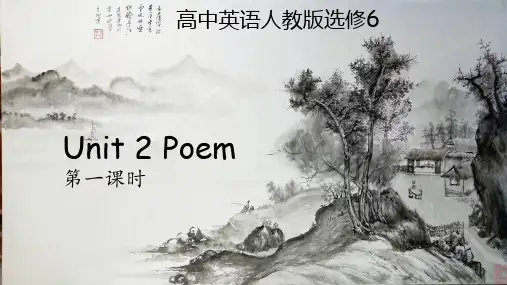
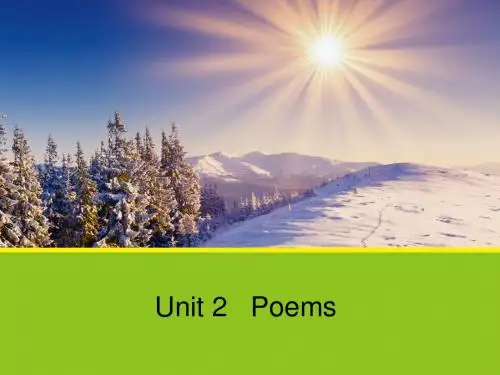


人教版高中英语选修6《Unit 2 Poem s》教案2篇Teaching plan of unit 2 Poems编订:JinTai College人教版高中英语选修6《Unit 2 Poems》教案2篇前言:英语作为在许多国际组织或者会议上都是必需语言,几乎所有学校选择英语作为其主要或唯一的外语必修课。
英语教学涉及多种专业理论知识,包括语言学、第二语言习得、词汇学、句法学、文体学、语料库理论、认知心理学等内容。
本教案根据英语课程标准的要求和教学对象的特点,将教学诸要素有序安排,确定合适的教学方案的设想和计划、并以启迪发展学生智力为根本目的。
便于学习和使用,本文档下载后内容可按需编辑修改及打印。
本文简要目录如下:【下载该文档后使用Word打开,按住键盘Ctrl键且鼠标单击目录内容即可跳转到对应篇章】1、篇章1:人教版高中英语选修6《Unit 2 Poems》教案2、篇章2:人教版高中英语选修6《Unit 2 Poems》教案篇章1:人教版高中英语选修6《Unit 2 Poems》教案教学准备教学目标教学目标(Teaching Aims)知识与技能(Knowledge and Skills)1.了解教学大纲关于语法填空的命题特点。
2.能够根据语法填空的命题特点自己编语法填空的题目3.掌握语法填空的解题方法与技巧过程与方法(Process and Methods)让每一位同学都能参与到课堂教学与活动中来,以小组或结对的形式进行相互学习和讨论。
情感态度与价值观(Feeling, Attitudes and Values)学习应对语法填空是与课文相结合,让学生在了解各种不同诗歌形式的背景下学习语法填空的设题与解题特点,从而更加理解英语诗歌的特色,更加懂得如何阅读和欣赏英语诗歌。
教学重难点教学重点(Important Points):1.让学生了解语法填空的命题特点2.掌握语法填空的解题方法与技巧教学难点(Difficult Points):语法填空中词性的转换教学过程(Teachers’ Activities)Step I: Lead-in① Review the new words and expressions of this unit by them together, and then do Task 1---speak out the other forms according to the giv en words② Listen to the song Jingle Bells and try tofill a word into each blank.Step II : Pre-practising1.Questions① Do you think it is difficult to complete the items of blank-filling with grammar knowledge?② Have you figur ed out the characteristics of the item?2.ExplainingIn this item there are 10 blanks for you to fill in with less than one proper word① some blanks with a given word while otherswith none② fill in the blanks with the proper form of the given word according to its grammatical and logical meaning.③ choose a preposition, pronoun, conjunction or an article to fill in the blank without any given word.3.DiscussionHow can we finish the items step by step with our grammar knowledge?① ___________________________________________.② _ __________________________________________.③ ___________________________________________.Step III : While-practising1.Making an item of grammatical blank-filling based on the para graph of the text.① more than 5 blanks.② some blanks with given word.③ others with none.2.exchange the item you made for your partner to complete it .3.The whole class finis h the one the teacher prepared for them.Step IV : Post-practising1.Check some of the students’ anwsers and give comments.2.Draw a conclusionStep V: Homework Assign ment1.Further improve your skills of dealing with the grammar filling.plete Ex.2 on Page 10, Nanfang New Class篇章2:人教版高中英语选修6《Unit 2 Poems》教案【按住Ctrl键点此返回目录】教学准备教学目标Teaching goals1.Target languagea. Important words and phrasesPoem, poetry, recite, aspect, convey, nursery, rhyme, diamond, cottage, balloon, sparrow, tease, salty, endless, translate, nursery rhyme, take it easy, run out of, make up ofb. Important sentencesWhich poem is about things that don’t make sense?Poets use many different forms of poems toexpress themselves.I hadn’t taken my eye off the ball.We hadn’t taken it easy.The poem is made up of five lines.A lot of Tang poetry has been translated into English. The translations have a free form that English people like to copy.2.Ability goalsa. Enable Ss to talk about different types of poems: nursery rhymes; list poems; cinquain,; haiku; Tang poemsb. Enable Ss to talk about different purposes of writing poems.c. Understand the main theme of each poem.d. Enable Ss to chant some of their favorite poems.3.Learning abilityEnable Ss to distinguish different types of poems 教学重难点Teaching important points1.Talk about five main types of poems.2.Understand the main purpose of writing the poems.Teaching difficult points1.Find the rhythm of each poem.2.Chant the poem.3.Understand the main purpose of writing the poems.教学过程Teaching procedures to share a feeling or experience; to describe something in detail or give an impression; to get the reader to think about an idea; to express a point of view; to make the reader experience the sight, sounds, smells, feel and tastes of something; to create a mood, to play with words--- their sounds, rhyme and rhythm.)If time permits, in small groups or as a class, discuss the kinds of topics that poets write about.( people, animals, nature, landscapes, the sea, the seasons, stories, death, war, youth and old age,feeling and experiences, emotions like love, hate, sadness, regret and desire, etc.)Step 4.Pre-readingPeople from different countries write different kinds of poems. Get Ss to discuss the questions on Page 9 with their partners: Do you have a favorite poem in Chinese? Why ? Do you have a favorite poem in English? Why?As to exercise 2, give Ss practice in animportant reading skill: scanning a text, that is, looking through a text quickly to find specific information. Read the table in exercise 2 with the Ss. Tell them that they are going to look for the information in the table, just in the poems themselves, not in the other parts of the text. They are to look only for those pieces of information and not readevery word. Do an example with them.Suggested answers to exercise 2:Step 5.ReadingScanningGet the Ss to read the passage quickly and accurately and meanwhile help the Ss to form a good habit of reading. Teacher gives Ss a couple of minutes to look through the whole passage. Tell them to read the text silently and then ask some detailed questions about the text on the slide show . Teacher should encourage Ss to express their ideas.Q1.Why do people write poetry?Q2.How many forms of poems are mentioned in the passage? What are they?Q3.What does “nursery rhyme” mean? Why do they delight small children?Q4.What’s the characteristic of “list poems”? What about “cinquain”?Q5.Why do English People like “Haiku”?Q6.Are you familiar with Tang Poems? Do you know the title of the last poem in the text?ListeningBefore Ss read the text, have them close their books and listen to the text with their eyes closed. This gives Ss the opportunity to listen to the sounds or “music” of the poems before reading them in detail. Tell them that it doesn’t ma tter if they don’t understand every word.First readingGet Ss to read the text carefully, finding the one sentence that sums up the paragraph of each part.. Underline the topic sentence.Second readingTell Ss that they are going to look at the rhythm of two of the poems. Make sure they know what rhythm is. Read the limerick aloud and have Ss listen for the strong beats. Then have them clap the strong beats asyou read. Mark the strong beats on the limerick on the board.There was an old man with a beardWho said “it is just as I feared”.“Four insects and thenTwo birds and a henHave all made a home in my beard”.Now read the poem A & B. Ask them to mark the strong beats on the two poems that have a strong rhythm. Check their answers . Then play the tape and get them to clap to the strong beats in those two poems.Third readingJust as any scene can serve as the subject of a painting, so any part of daily life can provide material for a poem.. Of course, the choice that the artist or poet makes relates to his or her purpose. Poetry is usually short and compact, so it should beread several times, preferably aloud, to appreciateits meaning. Read the last poem (Poem H), and answer the following questions:Q1.What parts of the poem suggest that the woman loves her husband?Q2.How do you understand the sentence” Shouldthe journeyer return, this stone would utter speech.”? Explain the sentence in your own words.Q3.What picture do you have in your mind when you read the above sentences?Q4.Do you know the Chinese title of this poem? Do you know the Chinese version of the poem?Step 6.Make a short summary of this period.课后习题Homework1.Surf some websites to find out more information about poets.2.Review the content of the reading passage.3.Finish the exercises on Page 12& 13.-------- Designed By JinTai College ---------。
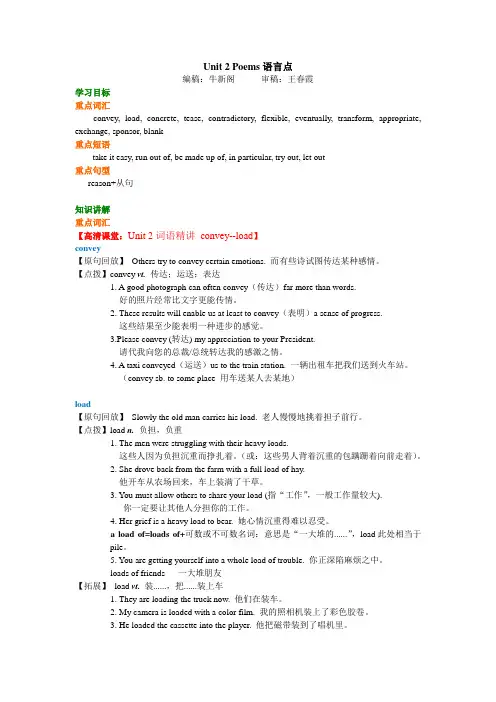
Unit 2 Poems语言点编稿:牛新阁审稿:王春霞学习目标重点词汇convey, load, concrete, tease, contradictory, flexible, eventually, transform, appropriate, exchange, sponsor, blank重点短语take it easy, run out of, be made up of, in particular, try out, let out重点句型reason+从句知识讲解重点词汇【高清课堂:Unit 2词语精讲convey--load】convey【原句回放】Others try to convey certain emotions. 而有些诗试图传达某种感情。
【点拨】convey vt.传达;运送;表达1. A good photograph can often convey(传达)far more than words.好的照片经常比文字更能传情。
2. These results will enable us at least to convey(表明)a sense of progress.这些结果至少能表明一种进步的感觉。
3.Please convey (转达) my appreciation to your President.请代我向您的总裁/总统转达我的感激之情。
4. A taxi conveyed(运送)us to the train station. 一辆出租车把我们送到火车站。
(convey sb. to some place 用车送某人去某地)load【原句回放】Slowly the old man carries his load. 老人慢慢地挑着担子前行。
【点拨】load n. 负担,负重1. The men were struggling with their heavy loads.这些人因为负担沉重而挣扎着。
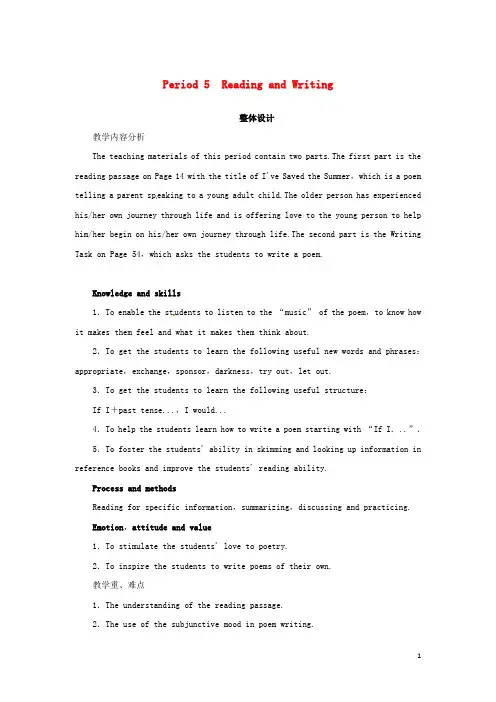
Period 5 Reading and Writing整体设计教学内容分析The teaching materials of this period contain two parts.The first part is the reading passage on Page 14 with the title of I've Saved the Summer,which is a poem telling a parent sp eaking to a young adult child.The older person has experienced his/her own journey through life and is offering love to the young person to help him/her begin on his/her own journey through life.The second part is the Writing Task on Page 54,which asks the students to write a poem.Knowledge and skills1.To enable the st udents to listen to the “music” of the poem,to know how it makes them feel and what it makes them think about.2.To get the students to learn the following useful new words and phrases:appropriate,exchange,sponsor,darkness,try out,let out.3.To get the students to learn the following useful structure:If I+past tense...,I would...4.To help the students learn how to write a poem starting with “If I...”.5.To foster the students' ability in skimming and looking up information in reference books and improve the students' reading ability.Process and methodsReading for specific information,summarizing,discussing and practicing.Emotion,attitude and value1.To stimulate the students' love to poetry.2.To inspire the students to write poems of their own.教学重、难点1.The understanding of the reading passage.2.The use of the subjunctive mood in poem writing.3.Teaching the students how to write a poem of their own.教学过程Step 1RevisionCheck the answers to the grammar exercises on Page 13 and explain the difficult ones.Step 2Pre-readingListen to the poem “I've saved the summer” and answer these questions:1.Do you think the speaker in the poem is more likely to be a girlfriend/boyfriend or a parent?2.Does the poem have a rhythmic pattern?3.Does the poem have rhyming words?4.When you were listening to the poem,did it make you feel something or think about something? What did it make you feel or think about?Suggested answers:1.Students' answers may vary.2.Yes(it has two strong beats per line).3.Yes.4.Students' answers may vary.Step 3Reading1.Circle the words that rhyme.What is unusual about the rhyming words in the last four lines?2.Try beating or clapping the strong beats of the rhythm as you read the poem to yourself.Now listen to the poem again and clap the strong beats.Suggested answers:1.Circled words:you,new;need,feed;nineteen,mean;way,day;own,own.The rhyming words in the last four lines are unusual because they are the same word although they each have a different meaning.2.The strong beats of the rhythm are marked below:I've saved the sum merAnd I give it all to youTo hold on winter morn ingsWhen the snow is new.I've saved some sun lightIf you should ever needA place away from dark nessWhere your mind can feed.And for myself I've kept your smileWhen you were but nine teenTill you're older you'll not knowWhat brave young smiles can mean.I know no ans wersTo help you on your wayThe ans wers lie some whereAt the bott om of the day.But if you've a need for loveI'll give you all I ownIt might help you down the roadTill you've found your own.Step 4DiscussionIn small groups discuss these questions:1.Who is the speaker in the poem and who is he/she speaking to? Give reasons to support your answer.2.Which of the following is the closest to the speaker's message? Give a reason for your choice.A.If it's cold,I'll warm you;if it's dark,I'll give you light;if you're hungry,I'll feed you;if you want love,I'll give it to you.B.Although the future may be difficult for you,whenever you need warmth and love,remember I'll have some to give you.C.While you're away I'll remember your smile and I'll love you always.When you return,I hope you will love me.Suggested answers:1.A parent(mother or father)speaking to a young adult child(son or daughter).We know that the speaker is probably a parent because he/she is offering the child unconditional love(But if you've a need for love,I'll give you all I own).We know that the son/daughter is a young adult because the speaker refers to the time when you were but nineteen.2.BStep 5Language studyShow the students the following language points in a slide show.1.appropriate(P13)【原句再现】Match the beginning of each sentence with the appropriate ending.把每个句子的开头与其合适的结尾连在一起。
教案1 Unit2 PoemsReadingTeaching material: NSEFC Book 6 —— Unit 2Teaching AimsTo cultivate students’ interest of poetry and improve their reading skills.Teaching Important & Difficult PointsHow to help the students to grasp and remember the detailed information of the reading material. Teaching aids:a tape recorder, a projector, Slides and PicturesTeaching ProcedureStep 1 Warming up1. Which poems and poets can you think of when seeing the following pictures?静夜思李白床前明月光,疑是地上霜。
举头望明月,低头思故乡。
古风其二李绅锄禾日当午,汗滴和下土。
谁知盘中餐,粒粒皆辛苦。
望夫石王健望夫处,江悠悠。
化为石,不回头。
山头日日风复雨,行人归来石应语。
2. Match the following information.Li Bai Song DynastyDu Fu Tang DynastyFan Zhongyan Tang DynastyMeng Haoran ModernGuo Moruo ModernMao Zedong Tang DynastyByron AmericaShelly EnglandEmerson EnglandTagore GermanyGoethe IndiaStep 2 BrainstormingDiscuss the reasons why people write poems.Fast readingScan the passage and answer the following questions.1. What is the main topic of the reading passage?2. What five kinds of poems does the reading passage talk about?different forms of English poemsnursery rhymes, list poems, cinquain, haiku, Tang poems.3. Scan the poems and fill in the following form.Which poem A B C D E F G H describes a person?tells a story?describes an aspect of aperson?is about sport?is about things that don’tmake sense?is recited to a baby?describes a river scene?has rhyming words at theend of lines?repeats words andphrases?Step 3 Careful readingT: Now let’s read the following five poems and finish tasks.Slide showListen to Poem A and pay attention to its rhyming lines and words.Hush, little baby, don’t say a w ord,Papa’s going to buy you a mockingb ird.If that mockingbird won’t s ing,Papa’s going to buy you a diamond r ing.If that diamond ring turns to br ass,Papa’s going to buy you a looking gl ass.If that looking-glass gets br o ke,Papa’s going to buy you a billy-g oa t.If that billy-goat runs aw ay,Papa is going to buy you another d ay.Read the poem by yourself again and answer the following questions.1. What’s the baby’s father going to buy if the lookin g-glass gets broken?2. What is Papa going to buy for the baby if that billy-goat runs away?3. What are the features of it?Keys:1. a billy -goat2. another billy-goat3. It has strong rhythm and rhyme and has a lot of repetition.Poem COur first football matchWe would have won…If Jack had just scored that goal,If we’d had just a few more minutes,If we had trained harder,If Ben had passed the ball to Joe,If we’d had thousands of fans screaming,If I hadn’t taken my eye off the ball,If we ha dn’t stayed up so late the night before,If we hadn’t taken it easy,If we hadn’t run out of energy,We would have won…If we’ve been better!Questions1. Did his or her team win the game?2. Why his or her team didn’t win the game?3. Does the speaker really believe his or her own excuse? How do you know?Keys:1. No, his or her team didn’t win.2. The players didn’t win because: Jack didn’t score that goal; they didn’t have enough time; they hadn’t trained hard….3. The speaker doesn’t really believe his or her own excuses, because there has too many ifs…Poem D&E1. What subject is the speaker writing about?2. Does the speaker like the subject? Give a reason for your answer.T: We have enjoyed so many English poems. Some are traditional forms of English poetry but some are not, for example haiku. (It comes from Japanese).In fact English speaker also have borrowed from another kind of Asian poetry---Tang poems from China.Poem H at the bottom of this passage is a translation from the Chinese. Poem HWhere she awaits her husband,On and on the river flowsNever looking back,Transformed into stone.Day by day upon the mountain top,wind and rain revolve.Should the journey return,this stone would utter speech.(By Wang Jian)望夫石王健望夫处,江悠悠。
Unit 2Poems《再别康桥》是中国诗人徐志摩脍炙人口的诗作。
1928年秋天,作者最后一次重访英国剑桥(旧译康桥),归途乘船经中国南海时,把剑桥的景色和缅怀之情融入诗中,表达告别剑桥的淡淡哀愁。
Saying Good-bye to Cambridge Again——by Xu ZhimoVery quietly I take my leave,As quietly as I came here;Quietly I wave good-bye,To the rosy clouds in the western sky.The golden willows by the riverside,Are young brides in the setting sun;Their reflections on the shimmering waves,Always linger in the depth of my heart.The floating heart growing in the sludge,Sways leisurely under the water;In the gentle waves of Cambridge,I would be a water plant!That pool under the shade of elm trees,Holds not water but the rainbow from the sky;Shattered to pieces among the duckweeds,Is the sediment of a rainbowlike dream.To seek a dream?Just to pole a boat upstream,To where the green grass is more verdant;Or to have the boat fully loaded with starlight,And sing aloud in the splendor of starlight.But I cannot sing aloud,Quietness is my farewell music;Even summer insects heap silence for me,Silent is Cambridge tonight!Very quietly I take my leave,As quietly as I came here;Gently I flick my sleeves;Not even a wisp of cloud will I bring away.再别康桥徐志摩轻轻的我走了,正如我轻轻的来;我轻轻的招手,作别西天的云彩。
高中英语真题:Unit2Poems学习目标:1、Knowledge and ability(知识与能力)Students will be able to learn and use the important words, ph rases and sentence patterns in this unit.② Students will be able to use the key words , phrases and s entence patterns.③Enjoy a poem written by Rod Mckuen.2、Process and approaches(过程与方法)① Students will get to develop their independent and critical t hinking ability and co-operative learning ability along with understanding of the pass age.② Students will learn how to appreciate the poem----I’ve Save the Sun.3、Emotions and values(情感与价值观)① Students will be able to enjoy the poem.② Students will be able to how to be thankful to their parents by reading the poem.学习重点与难点:Key pointsHow to make students understand the deeper meaning of the poem.How to help students master the important words and phrase s.Difficult points① How to help students to appreciate the poem.② How to help students gradually develop their critical ways of thinking.【Before class】重点单词【While class】I、单词拼写1._______ (背着) with the necessities,we made it convenient for our travel.2.Young people should learn to behave ___________ (恰当地),especially on formal occasions.3.After a few minutes our eyes got used to the _________(黑暗).4.He bent his face down to the fire, seeking comfort from its ______.5.She won a __________(奖学金) to study at Oxford University.6.We still ___________ gifts at Christmas.7.If you are lost in the wood, it’s very handy to have a _____ __ with you.8.They promised to love each other f_________.II. Fill in the blank1. ________ (押韵) and _________ (节奏) are essential for a poem.2. When appreciating a poem, we need to learn its _________ (情感).3. Poetry ______________ (受欢迎) adolescents.4.诗人在他们的诗中表达他们的情感。
教师学科教案[ 20 – 20 学年度第__学期]任教学科:_____________ 任教年级:_____________ 任教老师:_____________xx市实验学校Period 2Language Study整体设计教学内容分析The emphasis of this period will be placed on the important new words,phrases and sentence patterns in Warming Up,Pre-reading,Reading,Comprehending and Discovering useful wordsand expressions in Learning about Language.There are altogether 50 new words and phrases inthese five parts.22 of them are marked with triangles,which shows that the students needn't learnthem by heart.It is enoug h to recognize them when meeting them while reading the passage.Theother 28 should all be remembered,among which the following 8 words and expressions are evenmore important:concrete,take it easy,in particular,flexible,eventually,transform,run outof,be made up of.They are all very useful and important.So are the sentence patterns “Some poems tell a story,“Some rhyme(likeor describe something in a way that will give the reader a strong impression.”B) while others do not(like C).” and “Another simple form of poem that students can easilywrite is the cinquain,a poem made up of five lines.” We ought to pay more attention to them.三维目标设计Knowledge and skills1.To get the students to learn to use the following important new words and phrases freely:rhyme,concrete,pattern,tease,endless,translation,take it easy,in particular,convey,flexible,branch,eventually,transform,forever,run out of,be made up of.2.To get the students to understand and use the following important and useful sentence patterns:(1)Some poems tell a story or describe something in_a_way_that_will_give_the_reader_a_strong_impression.(2)Some rhyme(like B) while others do not(like C).(3)Another simple form of poem that students can easily write is the cinquain,a poem made_up_of_five_lines.Process and methods1.To help the students to understand the meanings of the above useful new words and expressions in the context,and then give some explanations about them,and at last offer some exercises to make the students master their usages.2.To ask the students to make up their own sentences by imitating the above sentence patterns.3.At t he end of the class,make students do more exercises for consolidation.In doing so,they can learn,grasp and use these important language points well.Emotion,attitude and value1.To stimulate students' interest in learning English.2.To develop students' sense of cooperation and teamwork.教学重、难点1.Important new words and expressions:rhyme,concrete,pattern,tease,endless,translation,take it easy,in particular,convey,flexible,branch,eventually,transform,forever,run outof,be made up of.2.Important and useful sentence patterns:.(1)The attributive clause with the antecedent “way”.(2)Compound sentences with “while”(3)Past participles as the postpositive attributive.3.Some difficult and long sentences in the text.教学过程Step 1Revision1.Check the homework exercises.2.Ask some students to tell about some simple forms of English poems.Step 2Reading and findingGet students to read through Warming Up,Pre-reading,Reading,Comprehending and Discovering useful words and expressions in Learning about Language to underline all the new words and useful expressions or collocations in these parts.Read them aloud and copy them downin the exercise book.Step 3Practice for useful words and expressions1.Turn to Page 12.Go through the exercises in Discovering useful words and expressions with students and make sure they know what to do.2.Give them several minutes to finish the exercises.They may first do them individually,and then discuss them with their partners.3.Check the answers with the whole class and explain the problems they meet where necessary.Step 4Vocabulary studyⅠ.简单知识扫描1.poem/poetry(P9)Poet(P10)【原句再现】These little poems and songs might have been some of the first poetry you learned.这些小诗歌或许就是你最早学到的一些诗歌。